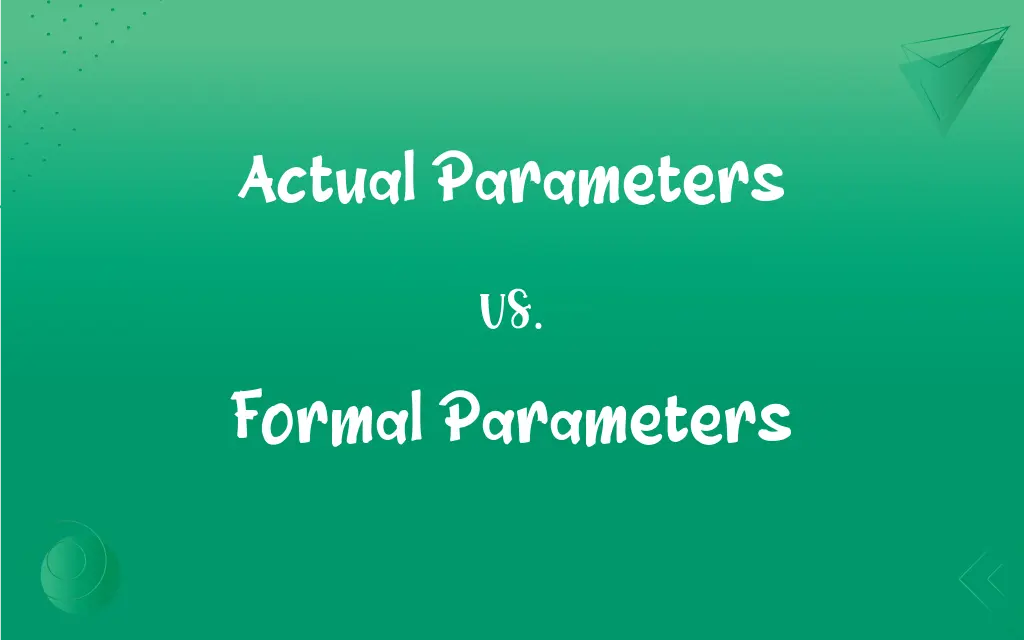Actual Parameters vs. Formal Parameters: What's the Difference?
Edited by Aimie Carlson || By Janet White || Published on March 17, 2024
Actual parameters are the values passed to a function during a call, whereas formal parameters are the variables defined in the function declaration to receive those values.

Key Differences
Actual parameters, also known as arguments, are the specific values or variables passed to a function when it is called. These parameters provide the actual data that the function operates on. In contrast, formal parameters are the variables specified in a function's definition that accept these values.
When a function is invoked, each actual parameter is matched with a corresponding formal parameter. The actual parameters can be literals, variables, or expressions, whereas formal parameters act as placeholders within the function, representing the inputs.
The scope of actual parameters is limited to the calling function, meaning they exist outside the called function. Formal parameters, however, exist within the scope of the function definition and are used to manipulate the data passed by the actual parameters.
In terms of value, the actual parameters contain the real values that the function operates on during execution. Formal parameters, however, are merely a reference or a copy of these values, depending on the language's parameter-passing mechanism.
The role of actual parameters is to pass specific data into a function, facilitating the function's operation on different data each time it is called. Formal parameters enable a function to be generalized and reusable, as they abstract the specific data being processed.
ADVERTISEMENT
Comparison Chart
Definition
Values passed to a function during a call
Variables in function definition to receive values
Role
Provide specific data for function operation
Act as placeholders for data in function
Scope
Exist outside the called function
Exist within the function
Value Nature
Contain real values for the function
References or copies of actual values
Purpose
Facilitate varied data input for each call
Enable function reusability and abstraction
ADVERTISEMENT
Actual Parameters and Formal Parameters Definitions
Actual Parameters
Can be literals, variables, or expressions.
CalculateArea(radius, height) uses radius and height as actual parameters.
Formal Parameters
Variables in a function declaration to receive values.
In function sum(int a, int b), a and b are formal parameters.
Actual Parameters
Exist outside the function being called.
PrintMessage(message); here, message exists outside and is passed as an actual parameter.
Formal Parameters
Represent inputs as references or copies.
AddNumbers(int x, int y); x and y are formal parameters holding references or copies.
Actual Parameters
Facilitate dynamic data input into functions.
In drawCircle(diameter), diameter is an actual parameter, allowing different circle sizes.
Formal Parameters
Act as placeholders within the function.
CalculateArea(double radius, double height) uses radius and height as formal parameters.
Actual Parameters
Specific values passed to a function call.
In sum(5, 10), 5 and 10 are actual parameters.
Formal Parameters
Enable function reusability and generalization.
DrawCircle(double diameter); diameter as a formal parameter allows reuse with different values.
Actual Parameters
Actual data used by the function during execution.
AddNumbers(x, y); x and y are actual parameters providing data for the function.
Formal Parameters
Exist within the scope of the function.
In printMessage(string text), text is a formal parameter within the function.
FAQs
What are formal parameters in a function?
Variables defined in a function to receive actual parameters.
Where do formal parameters exist in code?
Within the function's definition.
Why are actual parameters important?
They provide the specific data a function needs to operate.
Can actual parameters be expressions?
Yes, actual parameters can be expressions, literals, or variables.
What are actual parameters in programming?
Values or variables passed to a function during a call.
What is the purpose of formal parameters?
To generalize a function for different inputs.
Do actual parameters have to match formal parameters?
In type and number, yes, they should correspond.
How are formal parameters named?
Based on convention and clarity, to indicate their purpose.
What happens to actual parameters after a function call?
They remain unchanged in the calling environment.
Are formal parameters same as function arguments?
No, formal parameters are placeholders, while arguments are actual values passed.
Are actual parameters always necessary in a function call?
Yes, unless the function has no parameters or has default values.
Why are actual parameters variable in nature?
To allow dynamic and flexible data input for functions.
How are formal parameters used in recursive functions?
They act as new instances with each recursive call.
Can formal parameters have default values?
Yes, in some programming languages.
Can formal parameters be modified within a function?
Yes, but it depends on the parameter-passing mechanism.
Can actual parameters affect the function's behavior?
Yes, as they provide the data the function works with.
Can a function have no formal parameters?
Yes, a function can be defined without formal parameters.
Do actual parameters change between function calls?
They can vary with each function call.
What determines the type of actual parameters?
The type of data being passed to the function.
Is the number of formal parameters fixed?
Yes, it's defined when the function is declared.
About Author
Written by
Janet WhiteJanet White has been an esteemed writer and blogger for Difference Wiki. Holding a Master's degree in Science and Medical Journalism from the prestigious Boston University, she has consistently demonstrated her expertise and passion for her field. When she's not immersed in her work, Janet relishes her time exercising, delving into a good book, and cherishing moments with friends and family.
Edited by
Aimie CarlsonAimie Carlson, holding a master's degree in English literature, is a fervent English language enthusiast. She lends her writing talents to Difference Wiki, a prominent website that specializes in comparisons, offering readers insightful analyses that both captivate and inform.
































































